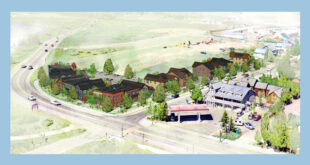A small fee on paper bags likely
By Mark Reaman
The Crested Butte town staff will draft an ordinance for the council that would ban single-use checkout/carryout plastic bags from town and impose a fee on approved paper bags. The council will consider the proposal—based primarily on a similar ordinance from Telluride—this summer and maybe as early as next month.
The issue has come before the council through the efforts of Sustainable Crested Butte, a group spearheaded by recent CBCS graduate Benjamin Swift. Swift made it clear that the ban would not impact a wide variety of plastic bags used in town—for example, bags used for fresh produce, retail or medical marijuana, garbage bags, bags used to contain unwrapped prepared foods or bakery goods and more.
An advanced recovery fee would be imposed on each paper bag handed out in town but only paper bags that meet certain standards would be allowed. The paper bags would have to be manufactured by 100 percent recycled content, contain no old growth fiber and be 100 percent recyclable. Swift suggested that fee be 30 cents per bag. Half of that would be retained by the business, with the other half going to the town to be used for education or reusable bags. Swift explained that the 30-cent fee would be collected by businesses.
“The customer must pay 30 cents per permitted paper bag that they purchase, and there is language in the ordinance prohibiting stores from ‘absorbing’ that cost themselves in order to refund the customer,” Swift explained.
Fines would be imposed on businesses that don’t abide by the ban.
In a June 20 presentation to the council at a work session before the meeting, councilman Chris Ladoulis showed some skepticism. He noted that Clark’s Market would be the primary business affected by the ban. He asked for other examples and Swift said plastic bags being used by Pooh’s Corner and the Mountain Store would not be in compliance.
“Why did you pick Telluride to base the ordinance on?” Ladoulis asked. “How is it working there? Are residents and visitors okay with it? Some towns have had their bans overturned by referendums.”
Swift said he had talked to some citizens and business owners from Telluride and they all said they were happy with the ban.
“Telluride is a town a little bit like us,” noted town attorney John Belkin, who helped Swift with his presentation points. “That is one reason we modeled this after them. The owner of Clark’s that has a market in Telluride told Bob [Gillie] that he has no complaints with the Telluride regulation. The town attorney over there said they have not received any complaints about the ordinance.”
Ladoulis said imposing a new fee of 30 cents a bag onto Clark’s adds to the competitive disadvantage of people who shop for groceries in Gunnison.
“A lot of people living up here probably buy their groceries already in Gunnison, just like those in Telluride do major shops in Montrose,” said Belkin.
“My concern and what I’ve heard most is how it impacts retailers,” said councilman Jim Schmidt. “What are we accomplishing? If someone finishes a dinner at a restaurant on Elk Avenue and goes into a store to buy something, they probably won’t have their reusable bags with them. And what is the nexus of this 30-cent fee? Why not offer a discount to someone who brings their own bag?”
“What is success?” asked Ladoulis. “I’m concerned we will push too far and alienate some constituents, visitors and businesses.”
Travis Underwood of Chopwood Mercantile said at his store, they always ask people if they want a bag instead of automatically providing one. “We gave out two today,” he told the council. “The accounting aspect of this could be painful but it’s very workable.”
“There is an element of training ourselves to do the right thing,” said councilperson Erika Vohman. “We are drowning in trash on this planet. We have the opportunity to be cool and be good examples. Visitors can take the lessons they see here back home.”
“Why not encourage rental companies to have reusable bags in every unit that get changed out like the sheets at every turnover?” suggested citizen Joyce Rossitor.
“That’s a good idea with or without an official policy,” said Ladoulis. “But I’m concerned with putting a burden on someone by us telling them what a good idea is.”
“We will do extensive education so people aren’t surprised when they get here,” added Vohman. “There are things we can do so people aren’t stuck in Pooh’s Corner without a bag.”
Swift said his group was conducting a borrow-a-bag program in conjunction with an Australian group called Boomerang Bags. The idea is that a supply of canvas bags, some of them sewn by local volunteers and others bought from places like co-ops in Saguache, would be plentiful around town and used by tourists who leave them when finished.
“Clark’s is super interested in that program,” Swift told the council. “Bags are not an absolute necessity. The world does not end without bags.”
“It’s an awareness thing,” said Benjamin’s father Randy Swift. “People get excited about this. People really do think it is kind of cool.”
Ladoulis still wasn’t totally convinced. “What about the entire carbon footprint?” he asked. “Plastic bags are cheap because they take so little energy to produce. Most other bags have a larger carbon footprint. Reusable bags need to be washed and that adds to their footprint. Is this really the right message? We live at 9,000 feet where we impose a terrible carbon footprint. Using a Clark’s bag more than once makes it hard for a reusable bag to beat. Is our motivation pure or just window dressing to make us feel good?”
“That’s the beauty of the bags from say Saguache or Boomerang Bags. It keeps stuff out of the landfill,” said Swift. “We are taking incremental steps. The stores feel there is a need for some single-bag-use options, so we are not proposing a ban on paper bags.”
“My other big question is why does the town need to be involved so much in it? How much time and money will be spent on administration?” Schmidt asked.
“The town can use the money from the bag fees for education on the topic or for buying more reusable bags,” responded Swift. “It is a fee, not a tax in that the money must go to the Reusable Carryout Bag line item.”
During the council meeting, the council agreed to have the staff come up with a specific ordinance that the council can fine-tune.
“I think it sets an example for sustainability,” said councilwoman Laura Mitchell. “It is a step in the right direction. We should get going on this.”
“I think it is reasonable for an ordinance to come in front of us,” said Schmidt. “I want to talk about the fee and I don’t think putting educational material on the town website will reach that many tourists. Having a discount versus a fee is more palatable to me. I would also want to have a phase-in period as part of the ordinance.”
“I am in favor of moving forward with an ordinance but have some concerns that it could impact local Elk Avenue retailers in a negative way,” said mayor pro tem Roland Mason. “I don’t want them suffering expenses as a result of unintended consequences.”
Belkin and town staff will craft an ordinance and present it for consideration to the council. Belkin said that could be ready by next month’s meeting.
 The Crested Butte News Serving the Gunnison Valley since 1999
The Crested Butte News Serving the Gunnison Valley since 1999




